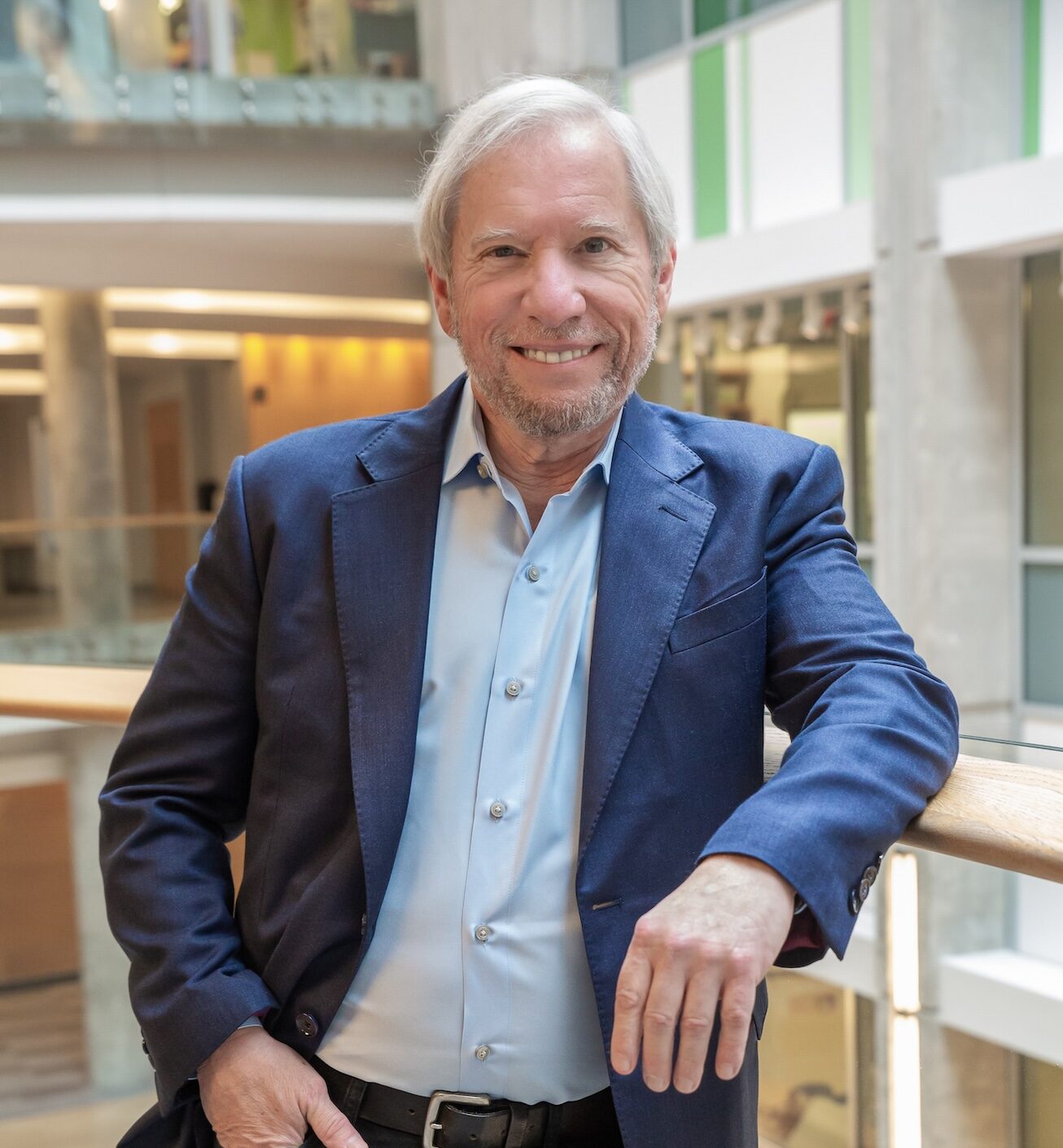
Dr. Dennis Liotta
In his decades-long career at Emory University, Dr. Dennis Liotta has drastically improved the longevity and quality of life of millions worldwide. These impressive accomplishments are not limited to just one significant discovery, as he has been directly involved in the discovery and development of multiple life-saving therapeutic agents. As a successful entrepreneur and visionary leader, he has created or fostered many businesses in the biotech and pharmaceutical industry. He has also pioneered new approaches to drug development in academia. All these achievements attest to his exceptional contributions to improving human health.
Dr. Liotta obtained his B.S. degree in chemistry from Queens College in 1970 and his Ph.D. degree in organic chemistry from the City University of New York in 1974. He then carried out postdoctoral research at the Ohio State University.
In 1976, Dr. Liotta joined Emory University as an assistant professor. He was promoted to full professor in 1988 and currently holds the Samuel Candler Dobbs Professorship. He served as the Chair of the Chemistry Department from 1993 to 1996 and Emory’s Vice President for Research from 1996 to 2000. In 2011, he was honored with the Thomas Jefferson Award, Emory University’s highest service award.
Dr. Liotta is a world-renowned medicinal chemist and an innovator in drug discovery. His research focuses on the discovery and development of novel antiviral, anticancer, and anti-inflammatory therapeutic agents. To date, he has authored more than 300 peer-reviewed publications, cited by scientists around the globe tens of thousands of times. These publications fundamentally shaped modern medicinal chemistry and profoundly influenced countless young researchers.
Dr. Liotta holds inventorship to over 100 issued patents in the U.S. alone and has more than 20 patent families currently under prosecution. He is the recipient of the 2022 Perkin Medal, generally considered to be the highest award for achievements in applied chemistry. He was elected to the National Academy of Inventors in 2014 and the Medicinal Chemistry Hall of Fame in 2010.
Dr. Liotta’s innovations have resulted in 18 life-saving FDA-approved antiviral therapeutics. These include Atripla®, Biktarvy®, Combivir®, Complera®, Delstrigo®, Descovy®, Dutrebis®, Emtriva®, Epivir®, Epivir-HBV®, Epzicom®, Genvoya®, Odefesey®, Stribild®, Symtuza®, Triumeq®, Trizivir®, and Truvada®.
Antivirals
Dr. Liotta has helped transform HIV/AIDS from a death sentence to a chronic infection in which patients can live active and productive lives. The Emory University Office of Technology Transfer estimates that about 95% of the people living with HIV/AIDS in the U.S., and many around the world, take or have taken one of the drugs co-invented by Dr. Liotta.
Dr. Liotta is most noted for his invention of emtricitabine and lamivudine, along with Drs. Raymond Schinazi and Woo-Baeg Choi. These two drugs are widely used as crucial components of anti-HIV combination therapies. They played instrumental roles in combating the HIV/AIDS epidemic in the U.S. and curbing the spread of HIV in other regions of the world. Millions of HIV/AIDS patients can live long and near-normal lives because of the discovery of emtricitabine and lamivudine. Emtricitabine, marketed under the name Emtriva®, made possible the first-ever combination therapy for HIV/AIDS as a once-daily pill. It is a component of many combination therapies used to treat HIV/AIDS, including Truvada®, Atripla®, Complera®, Stribild®, Genvoya®, Odefesey®, Biktarvy®, Descovy®, and Symtuza®. In addition to its use as a therapeutic, emtricitabine is also used in combination with other antivirals to protect healthy individuals from acquiring HIV – known as Pre-Exposure Prophylaxis or PrEP. Lamivudine, marketed under the name Epivir®, is a component of multiple combination therapies such as Combivir®, Trizivir®, Epzicom®, Triumeq®, Dutrebis®, and Delstrigo®. Notably, lamivudine also became the first drug approved by the FDA to treat hepatitis B infections. Both emtricitabine and lamivudine are on the World Health Organization’s List of Essential Medicines.
Other Therapeutic Areas
While Dr. Liotta’s most significant impact has come from the HIV/AIDS therapeutics, he has also made important contributions to other therapeutic fronts, such as oncology and neurological diseases. He co-discovered samuraciclib (formerly CT7001), a CDK7 inhibitor for treating hard-to-treat cancers. Samuraciclib is in Phase 2 clinical trials and has been fast-tracked by the FDA for use in two combination therapies to treat certain breast cancers. He also developed Q-122, an oral drug for controlling hot flashes in postmenopausal women, which has completed a Phase 2 clinical trial. In addition, his collaboration with Dr. Stephen Traynelis in Emory’s Department of Pharmacology and Chemical Biology laid the foundation for the discovery of NP-10679. NP-10679 successfully wrapped up its Phase 1 clinical trial and has received Orphan Drug designation from the FDA for treating subarachnoid hemorrhage or bleeding in the space around the brain.
In addition to scientific research and innovations, Dr. Liotta values the power of teaching and mentorship. The training and education of students and junior scientists is an essential component of Dr. Liotta’s career. His laboratory has a strong track record in cultivating the next generation of scientists and innovators. To date, he has mentored and supervised nearly 300 undergraduate and graduate students, postdoctoral fellows, research scientists, and visiting scholars – including ~100 undergraduate students, ~100 graduate students, and ~70 post-graduates.
Dr. Liotta always encourages his students and mentees to think independently. He generously provides them with abundant resources for their research projects and career development. Many alumni from his laboratory have successful careers in a wide array of sectors, including academia, the biotech and pharmaceutical industry, intellectual property law and technology transfer.
As a caring humanitarian, Dr. Liotta has devoted incredible efforts to improving human health worldwide, especially in underserved regions. Over the past twenty years, he initiated a series of outreach activities to cultivate the next generation of African scientists, implementing unique mechanisms to provide them with the scientific skills and business acumen required to address African healthcare needs.
In 2008, Dr. Liotta started iThemba Pharmaceuticals, a South African biotech firm focusing on developing medicines to treat diseases hitting Africa the hardest, such as HIV, tuberculosis and malaria. The company operated under a unique business model: it started out by pursuing contract research work in medicinal chemistry, such as custom synthesis and scale-up synthesis, the revenue from which was then utilized to fund its internal drug discovery efforts. Although a lapse in funding from the South African government led to the shutdown of iThemba Pharmaceuticals, it cultivated many talents in Africa and helped lay the foundation from which a biotechnology industry can grow.In 2008, Dr. Liotta started iThemba Pharmaceuticals, a South African biotech firm focusing on developing medicines to treat diseases hitting Africa the hardest, such as HIV, tuberculosis and malaria. The company operated under a unique business model: it started out by pursuing contract research work in medicinal chemistry, such as custom synthesis and scale-up synthesis, the revenue from which was then utilized to fund its internal drug discovery efforts. Although a lapse in funding from the South African government led to the shutdown of iThemba Pharmaceuticals, it cultivated many talents in Africa and helped lay the foundation from which a biotechnology industry can grow.
The most recent iteration of Dr. Liotta’s African outreach activities involves an initiative called AHIA (Advancing Healthcare Innovation in Africa). AHIA’s mission is to support and promote the advancement of health innovation and health-related technologies in Africa by advising, educating, and training African scientists in the business and legal aspects of the biotech and pharmaceutical sector. The initiative seeks to address the unique challenges of building Africa’s innovation capacity in drug discovery and development by creating platforms for identifying promising new local technologies, advancing the human capital needed to further those technologies through mentoring and education, and translating the technologies from laboratories to clinics and markets.
Dr. Liotta is the founding Editor-in-Chief of ACS Medicinal Chemistry Letters (ACS MCL), which was launched in 2010 to provide a rapid communication venue for high-quality letters and technology notes in medicinal chemistry and related fields. Under his leadership, ACS MCL has become one of the preeminent journals for disseminating innovative medicinal chemistry reports. Additionally, he serves as a Fellow of both the American Association for the Advancement of Science and the American Chemical Society.
Dr. Liotta embodies all of the finest qualities of a true leader dedicated to improving human health through exceptional and original research in medicinal chemistry. In addition to his excellent scholarship, he is an extraordinary inventor, innovator, entrepreneur, and leader. What differentiates Dr. Liotta from his peers is his ability to meld his scientific prowess with business acumen and intellectual property awareness, his dedication to innovating new approaches to drug development in academia and his lasting commitment to educating the next generation of scientists and innovators in the U.S. and the developing world.
